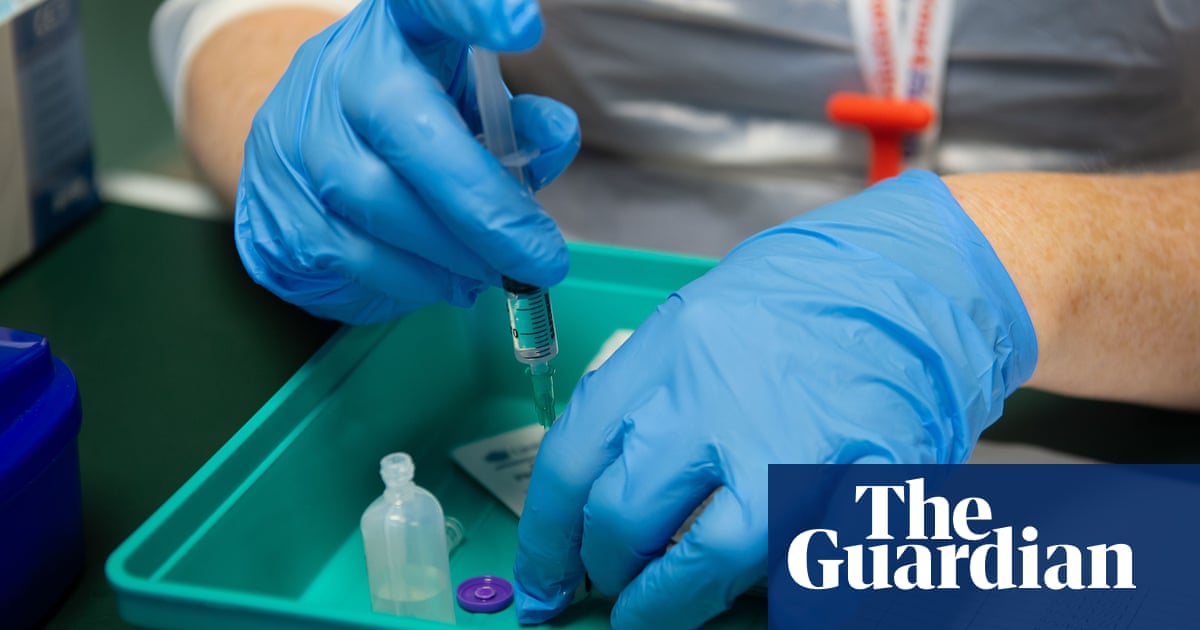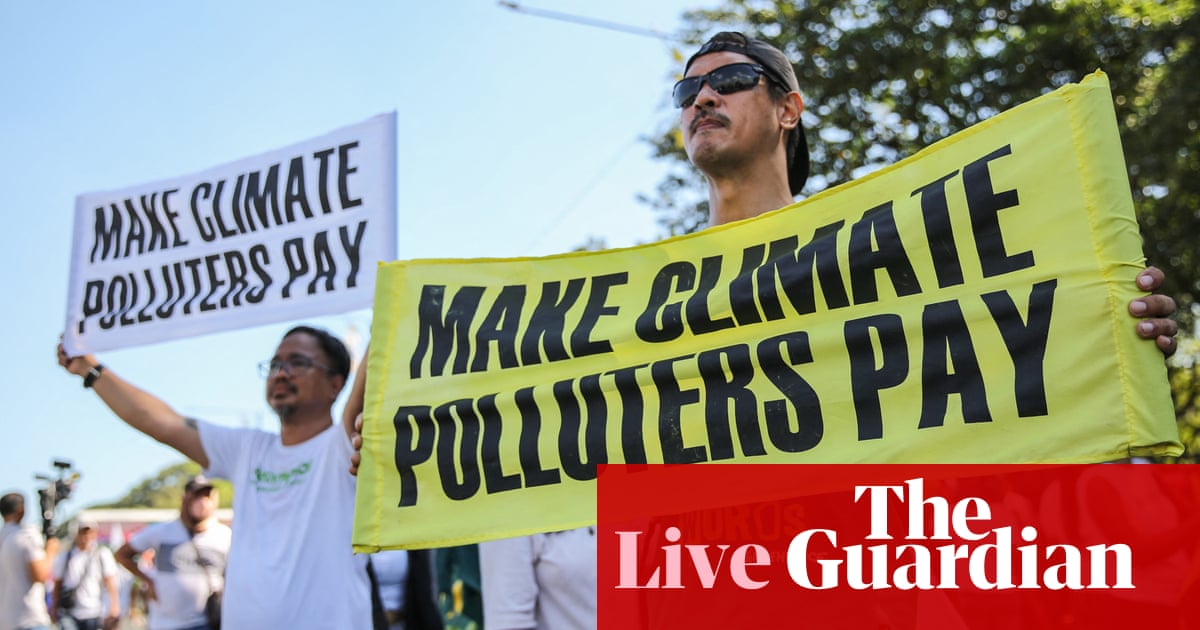
We are closing this live blog now but you can stay up to date on all the breaking news with our new blog below:
In New Zealand, the minister of Covid-19 response Chris Hipkins said there are no new cases of the virus in the community today, and this “does provide reassurance” for the upcoming long weekend and Waitangi next week.
“There is no reason people’s travel plans should change,” the minister said.
This week there have been three positive tests of Covid-19 in the community, all of the South African variant and thought to have been contracted in managed isolation at the Pullman Hotel in Auckland.
More detail on the Novavax announcement can be found in the company’s statement here.
The Guardian’s reportage is here.
A little more on Germany’s decision to not recommend the Oxford/AstraZeneca vaccine for over-65s. AFP reports.
Germany’s vaccine commission said Thursday it could not recommend the use of AstraZeneca’s coronavirus vaccine for older people, the latest twist in a row over the jab that has put Britain and the EU on a collision course.
The panel of scientific experts, called STIKO, said the vaccine should only be given to people aged 18 to 65 years old as “there is currently insufficient data to assess the efficacy of the vaccine for persons aged 65 years and older”.
AstraZeneca and British Prime Minister Boris Johnson immediately defended the jabs, which have already been widely used in Britain on older people.
A spokesperson for the British-Swedish company said the latest clinical trial data for its vaccine, developed with Oxford University, “support efficacy in the over 65 years age group”.
Johnson told reporters the UK’s own regulator had established “that they think the Oxford/AstraZeneca vaccine is very good and efficacious, gives a high degree of protection”.
AstraZeneca’s vaccine has not been granted approval yet for general use in the European Union.
But the bloc’s medicines regulator EMA is poised to authorise it on Friday.
The latest doubt over the vaccine came as AstraZeneca was already locked in an increasingly bitter spat with the EU over delivery problems.
Citing issues with its European factories, the company has informed the EU that it could only supply a quarter of the doses it had promised for the first quarter of 2021.
The huge delivery delay adds a further stumbling block to the EU’s already sluggish rollout of the vaccine compared to Britain or the United States.
With tempers flaring, Chancellor Angela Merkel called a high-level meeting for February 1 with her cabinet, Covid-19 vaccine manufacturers and leaders of Germany’s 16 states.
- ‘Best efforts’ -
Countries around the world are scrambling to get hold of the life-saving jabs to inoculate their populations against the virus that has claimed more than 2.1 million lives and infected more than 100 million people.
The emergence of more contagious variants first seen in Britain, South Africa and Brazil is putting further pressure on governments to speed up their immunisation programmes.
The EU-AstraZeneca dispute escalated Tuesday when the company’s chief executive Pascal Soriot said in an interview that it was prioritising supplies to Britain, which signed its contract three months before Brussels.
He argued that his company was only required to make a “best effort” to supply the bloc.
The European Commission erupted in fury, demanding on Wednesday that AstraZeneca make up for the delays by supplying doses from its UK factories.
But Britain insists it must receive all of the vaccines it ordered - and there are simply not enough to go round.
The EU said it would now require companies to declare any export of vaccines made in the bloc, a sign of growing distrust in AstraZeneca.
“The EU needs to take robust action to secure its supply of vaccines and demonstrate concretely that the protection of its citizens remains our absolute priority,” said European Council President Charles Michel.
- ‘Limited information’ -
Germany’s STIKO did not detail the data from clinical trials on the vaccine on older people.
However, prominent German media outlets Handelsblatt economic newspaper and Bild had reported that the efficacy on over-65s was below 10 percent - claims rejected by Germany’s health ministry and AstraZeneca.
A ministry spokesman said Wednesday: “A false claim does not become true just because it is repeated.”
He said however that AstraZeneca trials involved fewer older people than other manufacturers.
Around eight percent of the volunteers in AstraZeneca’s studies were around 56 and 69 years old and three to four percent were above 70, according to the ministry.
But “that the efficacy is only eight percent is incomprehensible and in our view, wrong,” the spokesman added.
In comparison, 41 percent of participants in BioNTech-Pfizer’s vaccine trials have been aged 56-85.
Britain’s MHRA regulator said in its consideration of the vaccine that “there is limited information available on efficacy in participants aged 65 or over, although there is nothing to suggest lack of protection”.
Mary Ramsay, head of immunisations at government agency Public Health England, also backed the AstraZeneca vaccine for older recipients.
“There were too few cases in older people in the AstraZeneca trials to observe precise levels of protection in this group, but data on immune responses were very reassuring.
“The risk of severe disease and death increase exponentially with age - the priority is to vaccinate as many vulnerable people as possible with either vaccine, to protect more people and save more lives.”
Good morning/afternoon/evening, wherever these words might find you. This is Ben Doherty in an uncharacteristically wet Sydney taking over our rolling coverage of the coronavirus pandemic. My thanks to my colleagues for their earlier stewardship.
To begin, a summary of the most recent developments.
Novavax Inc said on Thursday its coronavirus vaccine was 89.3% effective in preventing Covid-19 in a trial conducted in the United Kingdom, and was nearly as effective in protecting against the more highly contagious variant first discovered in the UK, according to a preliminary analysis.
A mid-stage trial of the vaccine in South Africa, where a troubling new variant of the virus is common, showed 60% effectiveness among people who did not have HIV.
France’s health ministry has announced supplies of the Moderna vaccine expected during February will be reduced by 25%. Elsewhere, a shortage of vaccines has forced Paris and two other regions – that together account for a third of the French population – to postpone giving out some first doses, a source familiar with the discussion and health officials said on Thursday. The public health agency for Paris and the surrounding region, an area of 12.1 million people, told regional hospitals on a conference call on Wednesday that from 2 February, all deliveries of first doses of the Covid-19 vaccine to medical establishments would be suspended, the source said.
French health authorities reported 23,770 new coronavirus infections over the previous 24 hours on Thursday, down from 26,916 on Wednesday. The country’s Covid-19 death toll rose by 344 to 74,800, the world’s seventh-highest, after an increase of 350 on Wednesday.
Brazil president, Jair Bolsonaro, who says he won’t take any Covid vaccine, has vowed to quickly inoculate all Brazilians, tempering his tone after his support fell due to a patchy vaccine rollout and a brutal second wave of infections, Reuters reports.
The coronavirus crisis cost the global tourism sector $1.3tn in lost revenue in 2020 as the number of people travelling plunged, the United Nations has said, calling it “the worst year in tourism history”.
A man has died of his wounds in Lebanon after clashes last night between security forces and protesters angered by the combined impact of a severe economic crisis and a coronavirus lockdown. There were fresh protests today.
Denmark will extend its current coronavirus restrictions by three weeks to curb the spread of a more contagious coronavirus variant first registered in the UK, its prime minister said on Thursday.
The US has detected its first cases of a coronavirus variant first detected in South Africa, health officials in South Carolina said.
German authorities have blocked the use of the Oxford/AstraZeneca vaccine on people aged over 65, the Financial Times has reported.
Spain has insisted it supported the European Union’s handling of a shortfall in Covid-19 vaccines after a leaked document suggested the health ministry was blaming Brussels, Reuters reports.
Russia delivered the first batch of its Sputnik V coronavirus vaccine to Bolivia on Thursday along with a larger shipment for neighbouring Argentina, as Moscow looks to play a key role in the region’s vaccine rollout despite delivery delays.
A plane carrying 240,000 doses of the vaccine arrived in Argentina, of which 20,000 doses went on to Bolivia, where President Luis Arce was waiting to greet the delivery in La Paz. Bolivia will be the second Latin American country to roll out the Russian vaccine, Reuters reports.
“Starting tomorrow, the distribution begins. There are 20,000 vaccines and two doses for each person,” presidential spokesman Jorge Richter told reporters.
“They will be for the sectors that are most exposed and at the front line of contagion.”
A vaccine from Novavax, of which the UK has secured 60m doses, has been shown to be 89% effective in preventing Covid-19.
Prof Peter Openshaw, from Imperial College London, said the findings showed the jab “gives high levels of protection”.
However, he said the 60% finding for the South African variant was a “concern” due to suggestions that prior infection with earlier variants of Covid-19 may not completely protect against subsequent infection by this variant.
Setback turned to success for six people stranded on a snowy roadway in the US when a Covid-19 vaccine team returning from a clinic with unused doses gave them roadside jabs.
Stuck in a snowstorm slamming Highway 199 in southwestern Oregon, the healthcare team that ran a mass vaccination event at a local high school on Tuesday quickly realized that six leftover inoculations would spoil before they could get to the city of Grants Pass, Oregon, to administer them as planned, according to the Josephine County Public Health Facebook page.
Instead, the JCPH staff and volunteers walked car to car, offering stranded motorists a chance to get vaccinated.
One of the recipients was a Josephine county sheriff’s office employee who had arrived too late for the school clinic, but ended up in the team’s roadside care amid the snowstorm.
“It was one of the coolest operations,” said JCPH director Mike Weber, according to the team’s Facebook page.
Labour leader Sir Keir Starmer, commenting on the Novavax vaccine showing 89% efficacy in UK trials, said: “Fantastic news about the Novavax vaccine.
“This is one more step towards getting Britain vaccinated. Thank you to everyone involved in this national effort.”
The UK’s vaccines minister, Nadhim Zahawi, said: “Having taken part in Novavax’s vaccine trial myself, I am particularly thrilled to see such positive results. I want to thank the thousands of trial volunteers, without whom these results would not have been possible.
It will now be for the regulator to do its crucial work in assessing the efficacy and safety of this vaccine, but if approved it will be a further boost to our vaccination programme.”
Kate Bingham, former chair of the UK government’s vaccine taskforce, said the results from Novavax’s coronavirus vaccine trials were “fantastic”.
Bingham told BBC News: “It’s a fantastic result because it shows that the Novavax vaccine is effective against the UK variant as well as the South African variant and has shown phenomenal efficacy, and it’s made in Teeside.
“So not only have we trialled the vaccine to show it is safe and effective, but we are also making it too.
“So we will be able to save lives in the UK.”
South Africa’s mid-stage trial of US-based biotech company Novavax Inc’s Covid-19 vaccine has shown it to be 60% effective for non-HIV individuals, the principal investigator of the study said.
Shabir Madhi, a professor of vaccinology at the University of the Witwatersrand, who is leading the clinical study for the Novavax Covid-19 vaccine in South Africa, said the results were good and showed the vaccine is highly effective toward immunisation against the coronavirus.
The results are far superior than any other vaccine against the new variant,” Madhi said.
John Moore, a professor of microbiology and immunology at Weill Cornell Medical College in New York, said the Novavax UK data is essentially the same as results for the vaccines from Pfizer and Moderna.
“It’s not statistically different. The vaccine basically works well in the predominant strain circulating in the UK, which means it’s likely to be equally effective in the United States,” he said.
Dr Amesh Adalja, an infectious disease expert at the Johns Hopkins Center for Health Security, said the results were in line with hopes and he was concerned that people would focus too much on the weaker effectiveness shown in South Africa.
“We’ve gotten spoiled because we’ve seen the Moderna and Pfizer numbers. I know people are going to be alarmed, but 60% efficacy against the new variant is acceptable,” he said, noting that the US Food and Drug Administration initially said it would approve a vaccine that was at least 50% effective.
The South African variant has been shown to evade antibody protection in lab studies by Moderna and Pfizer and BioNTech.
“The 60% reduced risk against Covid-19 illness in vaccinated individuals in South Africans underscores the value of this vaccine to prevent illness from the highly worrisome variant currently circulating in South Africa, and which is spreading globally,” said Profr Shabir Madhi, lead investigator of the Novavax vaccine trial in South Africa.
Novavax said it started making new versions of its vaccine to protect against emerging virus variants in early January and expects to select ideal candidates for a booster in the coming days. The company said it plans to initiate clinical testing of these new vaccines in the second quarter of this year.
Novavax is also running a 30,000-person trial in the US and Mexico that began in December, after at least two delays it said were due to manufacturing scaling issues that prevented clearance by the FDA.
The company has received $1.6bn from the US government in funding for the vaccine trial and for 100m doses.
Researchers in southern Brazil said they have discovered patients infected with two different strains of the new coronavirus simultaneously, reflecting concerns about the growing number of variants in the country.
The researchers said their study would be the first in the world to confirm co-infection with two strains of the coronavirus. The study has yet to be published in a scientific journal and has not been peer reviewed.
The patients, both in their 30s, were infected in late November with the P.2 variant of coronavirus identified in Rio, also known as the B.1.1.28 lineage, and simultaneously tested positive for a second variant of the virus.
Their symptoms were reportedly mild, with a dry cough in one case and coughing, sore throat and headache in the second. They did not require hospitalisation.
The cases underscore how many variants could already be circulating in Brazil and raise concerns among scientists that the coexistence of two strains in the same body could speed up mutations of new variants of coronavirus.
The study’s lead researcher, Fernando Spilki, a virologist at Feevale University in Rio Grande do Sul state, said:
These co-infections can generate combinations and generate new variants even more quickly than has been happening.”
“It would be another evolutionary pathway for the virus,” Spilki added.
Brazilian health regulator Anvisa said data on the Covid-19 vaccine developed by AstraZeneca Plc and Oxford University so far shows that it is safe for elderly patients, after Germany recommended it be given only to those aged under 65.
Anvisa added in a statement, however, that it is not possible to determine the efficacy of the vaccine, called Covidshield, for a population over the age of 65 because the participation of elderly people in the studies conducted so far was not statistically relevant.












